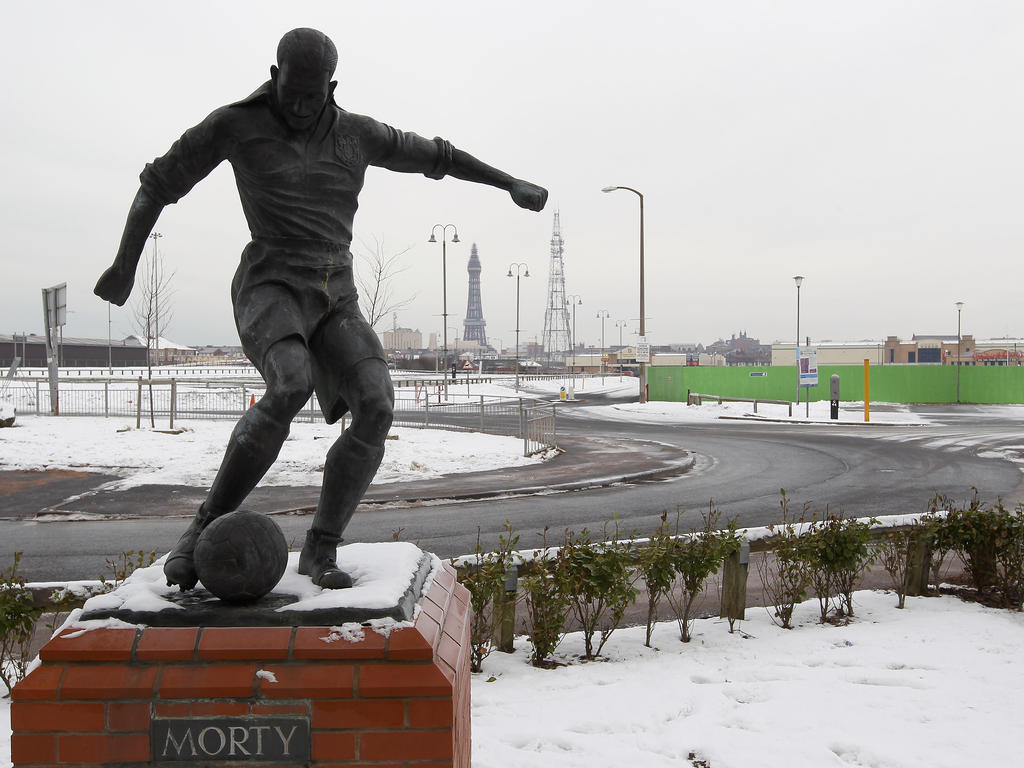Blackpool and the case of the missing statue

A bronze statue that went missing and then reappeared has become the symbol of the steady and unedifying decline of former Premier League football club Blackpool.
Depicting club legend Stan Mortensen, scorer of a hat-trick against Bolton Wanderers in the 1953 FA Cup final, the statue had stood on a plinth outside Blackpool's Bloomfield Road home in northwest England since August 2005.
Last week it vanished, after fans earmarked it as a rallying point for a protest against the club's owners, the Oyston family, prior to the final game of the season against Huddersfield Town.
Although it reappeared on Wednesday, the club's fans are furious, with the Blackpool Supporters' Trust describing what happened as "beyond contempt".
"It's embarrassing that we've got owners at the club that could even think about it, let alone do that to a club's hero," Stephen Smith from fan group Tangerine Knights told AFP. "It's utterly disgraceful."
Blackpool refused to comment on the statue when contacted by AFP, but in an email to a local politician that was leaked to regional newspaper The Gazette, the club said 'Morty' had been relocated for "safety reasons".
For Blackpool's supporters, who have seen their team slide from the Premier League to the third tier in only four years, the removal of the £25,000 ($38,100, 33,600 euros) statue -- which fans partially funded -- was a betrayal of the club's history.
Mortensen, along with fellow England international Stanley Matthews, was one of the stars of the Blackpool team that shone in the late 1940s and 1950s, reaching three FA Cup finals and achieving three top-four finishes in the old First Division.
FA Cup glory came at the third attempt, after losses to Manchester United in 1948 and Newcastle United in 1951.
While Mortensen scored three times in the 4-3 defeat of Bolton in 1953, the match became known as 'The Matthews Final' in honour of his illustrious team-mate, who inspired Blackpool to fight back from 3-1 down.
After relegation in 1971, Blackpool idled in the lower leagues until 2010, when an attacking team steered by irreverent manager Ian Holloway spent one season charming neutrals in the Premier League.
Blackpool's top-flight adventure reportedly earned the club £100 million, but the 'Seasiders' have nose-dived since, and supporters blame the Oystons, who they accuse of taking money out of the club.
Blackpool have gone through six managers in three seasons and began the current campaign with only eight first-team players following a close-season exodus.
Players had to wash their own kit after the kitman left mid-season and goalkeeper Joe Lewis was forced to wear an autographed shirt destined for a sponsor during one match because the club had run out of goalkeeper jerseys.
Having spent almost the entire campaign in the Championship relegation zone, Blackpool were condemned to the third tier at the beginning of April with six games still to play.
Last Saturday's final game against Huddersfield was abandoned after a pitch invasion in the 48th minute saw hundreds of angry supporters congregate in the centre circle and refuse to budge.
Weeks earlier, fans had launched eggs and fireworks at the Bloomfield Road directors' box.
Last season they lobbed tennis balls and tangerines -- a nod to the club's orange shirts -- onto the pitch.
But current manager Lee Clark has refused to criticise the protesters, acknowledging that a "very toxic atmosphere" has come to envelop the club.
"The club has lost its soul," says Smith. "It's lifeless, it's soulless. There's no passion."
The targets of the supporters' ire are chairman Karl Oyston and his father Owen, one of Britain's richest men, who bought the club in May 1988.
The conflict has produced lurid headlines, with the Oystons suing fans over internet comments and Karl Oyston facing a Football Association charge for branding Smith a "retard" during a heated text message exchange.
With 'Morty' back on his pedestal, a cherished link with Blackpool's history has been restored, but it is also a reminder for fans of the 128-year-old club that the past is all they have to cling to.






